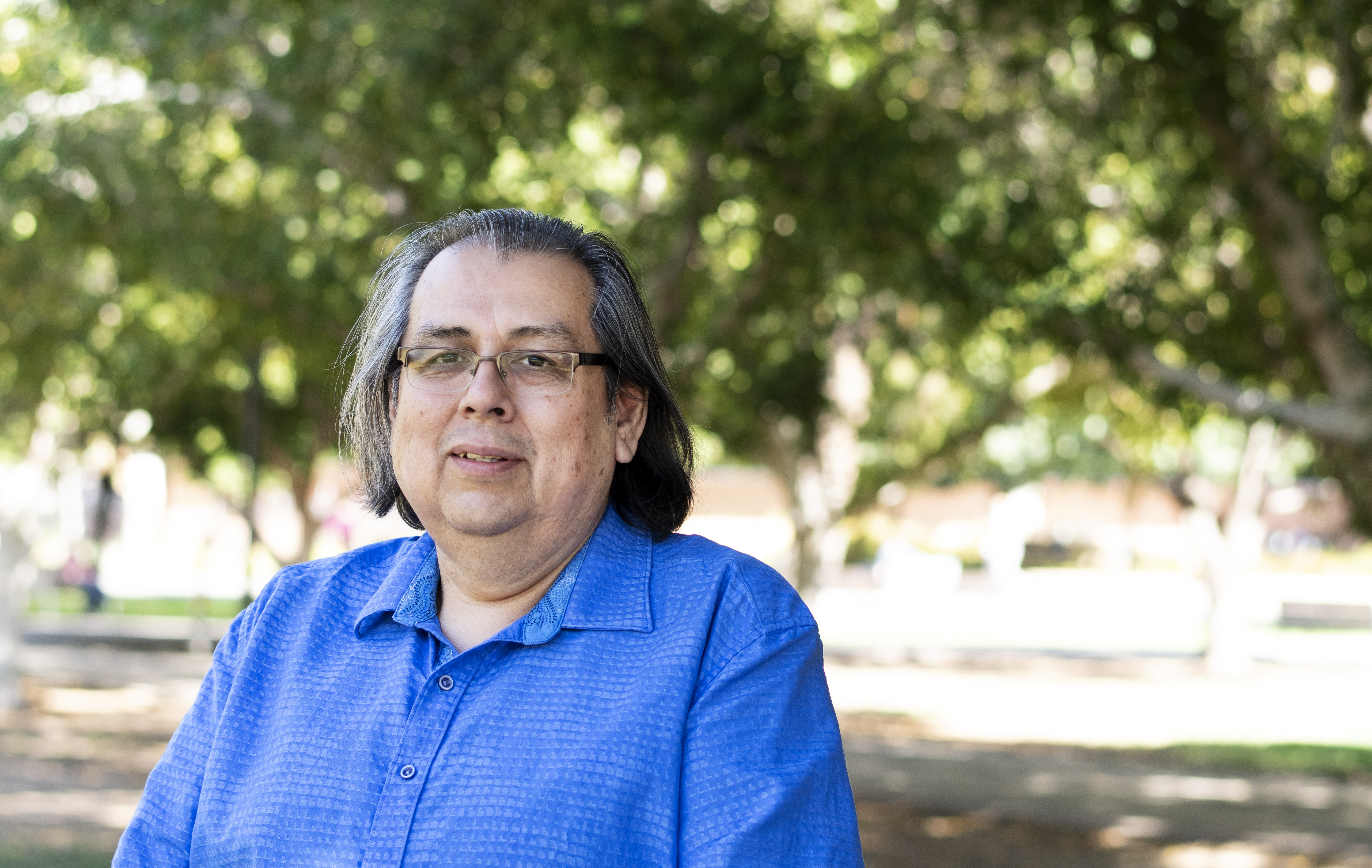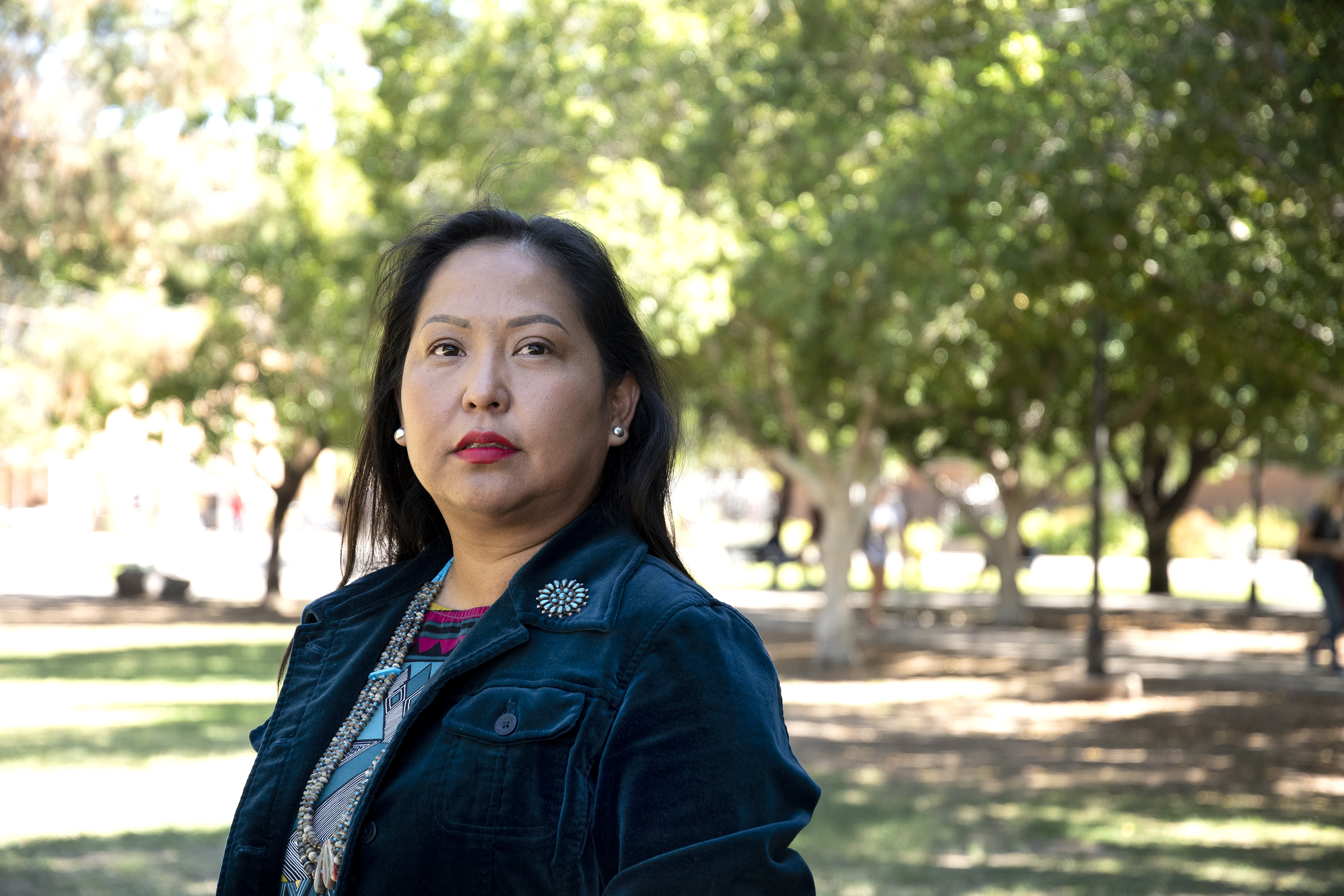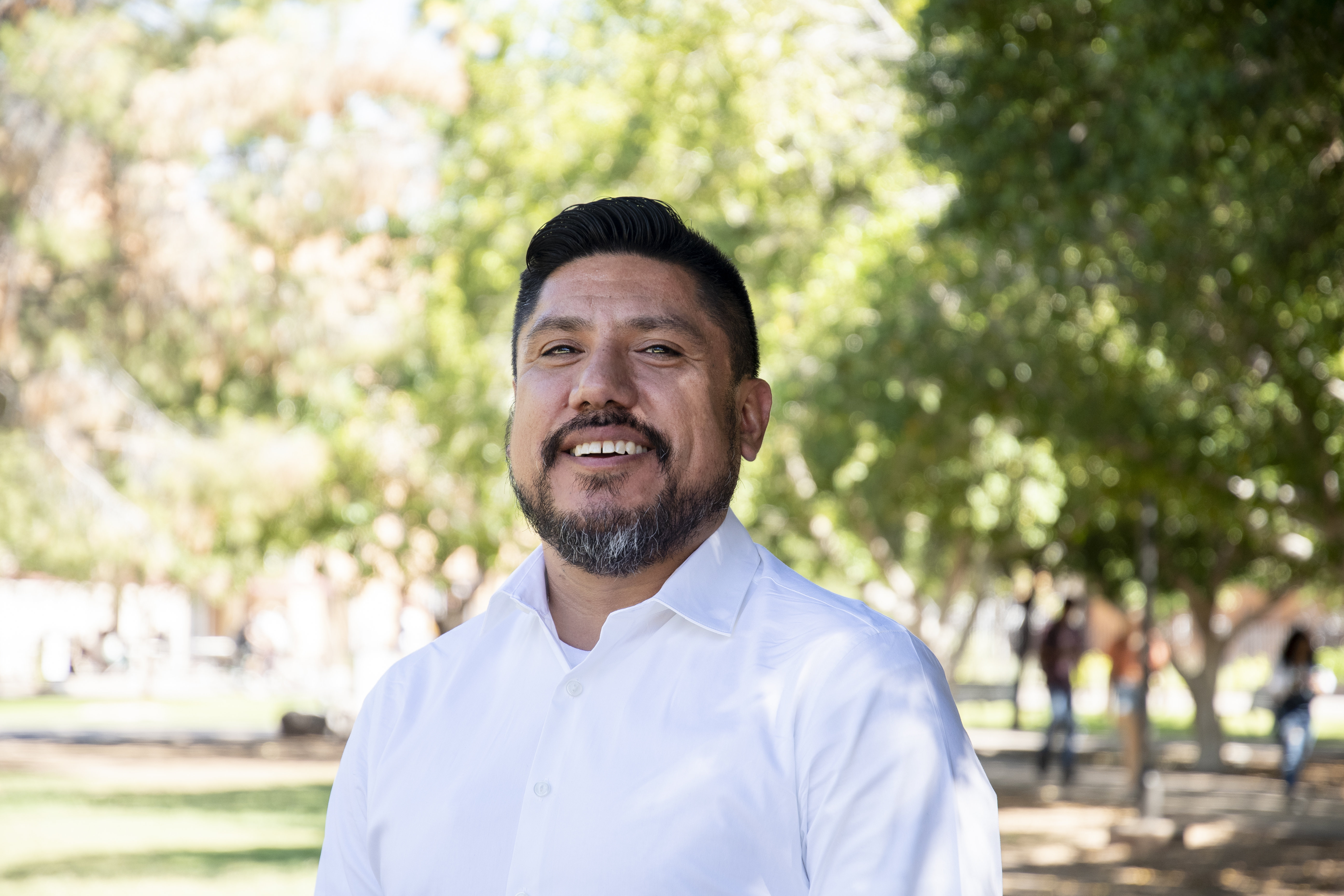'Still here:' Native American scholars discuss Indigenous Peoples’ Day
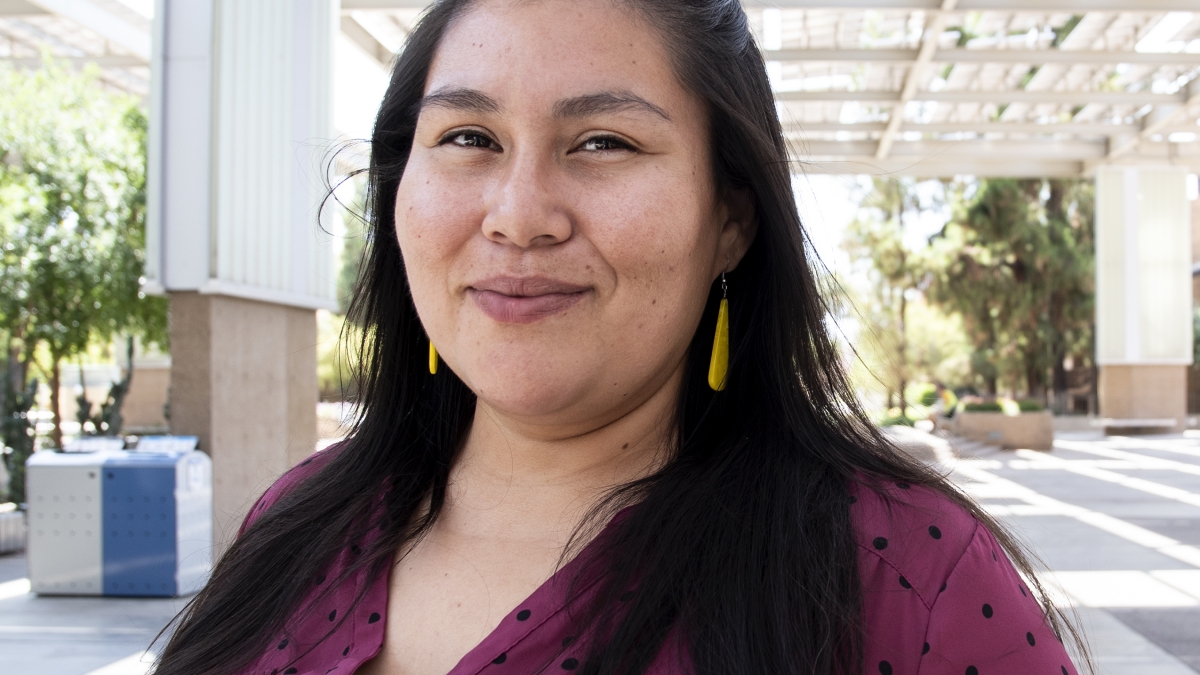
ASU alumna Laura Medina has attended the Indigenous Peoples' Day march in Phoenix for the past two years. This year, she helped organize it.
Growing up in Phoenix, Arizona State University alumnaLaura Medina graduated with a master's degree in indigenous rights and social justice from The College of Liberal Arts and Sciences’ American Indian Studies program in 2018. Today, she works as a student success and retention coordinator at the American Indian Student Support Services. Laura Medina enjoyed getting the day off school for Columbus Day every October. But she also remembers feeling conflicted. The holiday celebrates Italian explorer Christopher Columbus’ “discovery” of North America in 1492. And as a member of Michigan’s Ojibwe tribe, Medina knew that the land he sailed to was neither empty, nor undiscovered. Tribal civilizations like that of her ancestors were already there, and Columbus’ arrival was the start of a brutal colonization campaign that permanently altered their lives.
“Columbus Day did not feel right, even as a kid,” Medina said. “Back then, you’d sometimes hear people asking why we celebrate Columbus, then around 2012 I started hearing about the idea of celebrating something else, instead.”
Now she’s doing exactly that. This year, she’s spending the holiday with ASU students, local community members and fellow alumni for an Indigenous Peoples’ Day march through downtown Phoenix.
Organized this year by ASU’s student-led Alliance of Indigenous People, the event is the third of its kind in Phoenix.
The Indigenous Peoples' Day designation was first proposed in 1977, at the International Conference on Discrimination Against Indigenous Populations in the Americas in Geneva. Its proponents sought to shed light on the genocide, displacement and continued discrimination indigenous communities in North America faced as a result of colonization.
More than four decades later, Phoenix is one of over 100 cities and 15 states across the U.S. to recognize Indigenous Peoples’ Day in lieu of or alongside Columbus Day.
Medina said it’s an opportunity for Arizona’s 22 Native American tribes to be heard, and for the public to recognize a piece of history that has been left out.
“Colonization has made us invisible in the past, reclaiming this day gives us the power to challenge that and come together as a community,” she said. “I also think it’s exciting for people to see students of color from such an important institution leading this; it shows ASU is accessible to everyone.”
We caught up with other academics from The College of Liberal Arts and Sciences’ American Indian Studies program to hear more about the history of Indigenous Peoples’ Day and what it means to them.
David Martinez
The 1977 resolution helped propel the conversation about Indigenous Peoples’ Day forward. But David Martinez, an associate professor in the American Indian Studies program and a member of Arizona’s Gila River Indian Community, traces the idea back to the country’s first rights group created for and by Native Americans over a century ago.
“The Society of American Indians held their first meeting in 1911 and on their agenda was the establishment of an American Indian Day,” Martinez said. “The concept of Indigenous Peoples’ Day is in many ways the latest chapter in that effort, in that it served to give a sense of meaning to the American Indian identity and draw attention to the fact we exist.”
Though the society mostly disbanded after fighting for and winning federal citizenship rights through the Indian Citizenship Act of 1924, Martinez said the push for recognition they started lived on in the work of indigenous activists that followed. Celebrating Indigenous Peoples’ Day helps their fight continue.
"For a long time, history has been told from the side of the European discoverers, which is that Columbus embarked on this hero journey and found this land Western civilization hadn’t seen before,” he said. “There is no problem recognizing somebody's ancestor, in this case a European ancestor, having done something dangerous, but the presumption of discovery erases us from the narrative.”
He said it’s also about honoring contributions American Indians have made to society.
“Whether it’s episodes of tribes assisting settlers to get through winter, like at Plymouth Rock, or the indigenous sense of environmental stewardship and appreciation for the land, our culture has influenced a lot of facets of America,” he said. “I think one important thing to remember is that this holiday is also about acknowledging that impact.”
Jayme Deschene
Born and raised in the Navajo Nation city of Kayenta, Arizona, Jayme Deschene was surrounded by her Native American culture from a young age. She said Indigenous Peoples’ Day helps bring to light why tradition and land matter so deeply to indigenous communities.
“Land is very connected to being indigenous because our land holds our stories, our stories are our heritage, and our heritage is connected to the way we live today,” she said. “As a Navajo person, I am lucky to still have some of my homeland, but many others do not — I think this day is important to help people understand that when that land was taken, a part of our identity was taken too.”
Deschene graduated with a master’s degree in indigenous rights and social justice from the American Indian Studies program in 2015. She returned to campus a year later as a student success and retention coordinator with the American Indian Student Support Services, a position she still holds today.
Now living in Tempe, she said it can be challenging to ensure her three children get the full picture when it comes to understanding the past.
“My daughter is 7, and some of the school work she brings home about settlers at Plymouth Rock makes almost no mention of Native Americans,” she said. “I try to talk to her about what is missing or incorrect, and give her additional materials about our history.”
Celebrating Indigenous Peoples’ Day is one way to drive that understanding further forward.
“Sitting on campus, we are on ancestral tribal land right now, but a lot of people don’t realize that,” Deschene said. “Indigenous Peoples’ Day is not so much about older communities as it is about educating younger generations like my daughter’s and making sure our history, language and culture continues.”
Eric DeLorme
For Eric DeLorme, a graduate student pursuing a master’s degree from the American Indian Studies program, returning to school was a chance to gain more insight into cultures across North America.
“My mother is Mexican American and I am an enrolled Pueblo of Acoma tribal member in New Mexico, and a descendant of the Little Shell Tribe of Chippewa Indians in Montana,” DeLorme said. “I studied Chicana/o studies in my undergraduate years, now I want to expand my knowledge of indigenous peoples all the way from Canada down through Mexico.”
DeLorme sees Indigenous Peoples’ Day as a chance to recognize a historic trauma and honor the sacrifices made by communities that came before.
“I see this as a day to remember that we survived genocide, my ancestors fought hard so that I can put my feet on this earth today. The movement now is regaining the identities that were lost during colonization,” he said.
Some controversy between Columbus Day and Indigenous Peoples’ Day continues, but DeLorme said it’s important to keep conversations going, even when difficult.
“I think what’s happening now, with people discussing these differences, that’s a good thing, because it’s the first step in challenging the narrative,” he said. “By acknowledging another part of this country’s history, we can get closer to understanding one another.”
More Arts, humanities and education
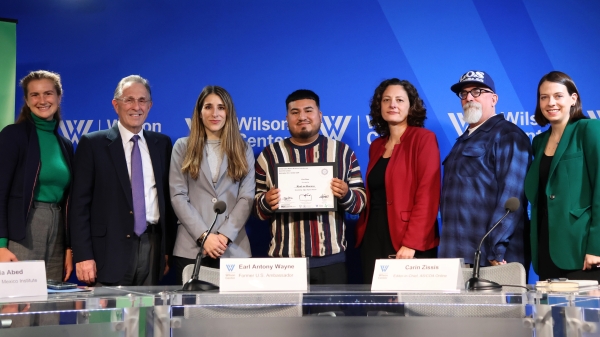
Kaleidoscope short film contest inspires powerful binational filmmaking in its second year
“We come to this country not to steal anybody’s jobs but to take advantage of the opportunities that the rest ignore. We’ve been…

School of Social Transformation faculty member assumes new title with NSF
School of Social Transformation faculty member and Founding Executive Director of the Center for Gender Equity in Science…

ASU's Neal Lester reflects on life, death of poet Nikki Giovanni
When Neal Lester heard on Monday that poet and activist Nikki Giovanni had died, the news hit hard.Lester, the founding director…
